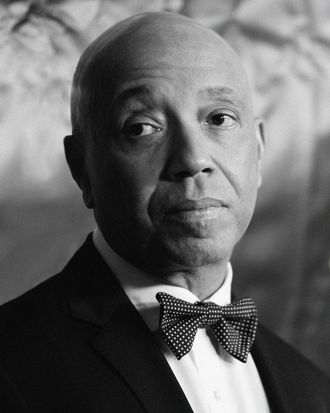
Hip-hop turned 50 earlier this year, and the anniversary party of the last 11 months, while fun, has been punctuated by oversights and disappointments. The industry’s emphasis on celebration has been prioritized over contending with the deep harm inflicted by a number of the men on the VIP list, a material tension that needs to be acknowledged to ensure that the genre has a chance to last another five decades. It is impossible, for instance, to discuss hip-hop’s transition to the “golden age” without discussing Run-DMC, Def Jam records, and Russell Simmons. His business aspirations are largely credited with having facilitated hip-hop’s transition from subculture to mainstream product. But the numerous allegations of harassment, rape, and sexual misconduct, though they linger as stains on his legacy, remain largely unremarked upon during these tributes.
On Wednesday, Simmons sat down with Graham Bensinger, host of the syndicated sport-and-celebrity-interview series In Depth with Graham Besinger, in Bali for his first sit-down since his June 2020 conversation with The Breakfast Club. In 2020, his appearance on the radio show was a panicked reaction to the much-talked-about documentary On the Record, which featured multiple survivors discussing their experiences with Simmons. The women of On the Record, including former artists and staffers at Def Jam, detailed the stories behind their allegations of rape by Simmons in the ’80s and ’90s and the irreversible tolls it took on their lives mentally, physically, and financially. One artist never got a record deal; another left for Arista, only to endure what she describes as harassment by L.A. Reid; another attempted suicide. On The Breakfast Club, Simmons minimized these claims as misconstrued sexual experiences, mere miscommunications that led to his character being maligned.
This week’s interview, which was posted on Besinger’s YouTube channel in a series of clips, has a decidedly different tenor. Simmons is calmer, less defensive — though still prone to bursts of agitation — because he alone has decided that he is fully exonerated of the allegations.
Many of his claims tread similar water as his previous attempts at disavowal: He took nine lie-detector tests; he has been “insensitive,” not violent. He alleges that despite Oprah publicly stating that she believed the women’s stories following her much-criticized departure from the On the Record project, she did not believe their claims and had audio from over 20 witnesses debunking their allegations. His insistence that his downfall was largely precipitated by social pressure — “Twitter cannot demonize people,” he tells Besinger at one point — overlooks the extensively vetted and fact-checked reporting by the Los Angeles Times, New York Times, and The Hollywood Reporter, among other outlets.
Simmons leans on a deeply flawed legal system as proof of his innocence. According to him, his lack of criminal charges or questioning by authorities is somehow indicative of a lack of guilt, conveniently leaving out the fact that many of the alleged assaults took place several decades ago and have long passed the statute of limitations. He admits that he has been observing the lawsuits filed under the Adult Survivors Act, waiting to see if he would have to negotiate any civil suits. “They’ve had a year, the accusers, to sue me, and I haven’t been sued,” he says, as if that acquits him of any culpability. Lost in his bluster is the perspective of survivors who — despite his belief that they may seek notoriety by attacking his stature — have the option to decline to participate in the ritualistic humiliation process that is repeatedly arbitrating their trauma in front of the world.
“We don’t want to not believe women; we have to believe women,” Simmons says in this week’s interview. “I think the culture and the climate was different, and the way people interacted was different. And I think to judge 40 years ago as if it was today, we get in trouble.” Simmons goes on to argue that the definition of rape has evolved: “It’s a serious word, but I think they’ve changed the meaning … somebody jumps out a bush and rapes somebody, it’s different.” It’s a myopic and jarring frame of analysis for someone who has long used his monetary support of certain nonprofits, in particular female-led projects, to inoculate himself from critique. While shocking, it reveals his inability to comprehend the nuances of rape, consent, and brutality outside of its most sensational examples, as opposed to the coercive, insidious, and unyielding violation that can happen with an acquaintance.
Simmons’s insistence that the climate is constructed to support and believe women’s claims happens to coincide with a recent wave of attention and empathy afforded to survivors who have gone public with traumatic experiences — rape, sexual misconduct, and other crimes related to sexual violence — with high-profile names in music and entertainment. Allegation after allegation continues to pile up for Sean “Diddy” Combs; Jimmy Iovine, L.A. Reid, Diplo, Axl Rose, Neil Portnow, Mike Tyson, and numerous others have reportedly faced either investigations or civil suits. The eagerness of public consumption suggests a cultural shift that amounts to a new cultural reckoning, but much of it is the thrill of celebrity gossip divorced from acknowledging the (often unnamed) survivors’ traumas as material and human.
Prior to the recent torrent of press, a number of women in the entertainment industry who have gone public with their trauma — Amber Heard, Megan Thee Stallion, Evan Rachel Wood — have been eviscerated for seeking justice. Time’s Up — and its legal-defense fund — are now defunct, adding a stain to the Me Too movement, and the rise of red-pill and incel influencers seems to have overwhelmed the marginal gains made through feminist conversations on rape culture.
The timing of Simmons’s emergence could not be more uncanny. As Simmons claims to have been absolved, even if not to the general public, his previous footsteps are being retraced by Combs. Combs has stepped down as the chairman of Revolt in a move that’s similar to when Simmons stepped away from All Def Digital, Def Pictures, and Tantris in 2017. As the accusations continued to mount, Simmons launched an ill-advised “#NotMe” campaign on Instagram, alleging that “My intention is not to diminish the #MeToo movement in anyway, but instead hold my accusers accountable. #NotMe.” Remnants of that indignance and bluster are reflected in Combs’s most recent statements posted to all social platforms, which begins with the thunderous headline “Enough is Enough.” “I will fight for my name, my family and for the truth,” Combs writes. It is a familiar cycle: Both are powerful titans of the hip-hop industry who thrived on being perceived simultaneously as larger than life and as family men; both are now pivoting to a narrative of targeted victimization as they began to wrestle with the implications of the accusations.
While alleged abusers such as Simmons and Combs continue to purport a simultaneous narrative of victim and tycoon, survivors are trapped in a double bind that limits their ability to reclaim their power. Speaking their truth isn’t enough, a civil case is a money grab, and a criminal case is not their choice to litigate; taking on a man of industry at the height of his power would intimidate most, no matter the conflict. Yet we continue to grant platforms for “canceled” individuals to offer their side of the story, despite offering minimal novel contributions to their claims beyond sensationalist tales and demanding that the survivors reengage with their trauma. There are no number of foursomes, of which Simmons mentions in his interview with Bensinger an an example of his now supposedly misinterpreted sexual past, that would make Simmons more or less of an alleged rapist; no definition of rape that has been expanded to include what Simmons recalls as him merely “speaking poorly” or being “crude.” The industry continuing to humor his narrative, even minimally, is simply platforming self-constructed fantasies with no grounding in truth, context, or reality.




